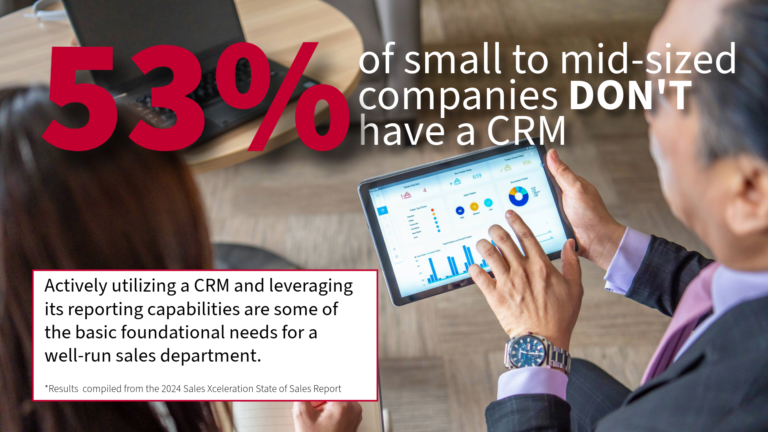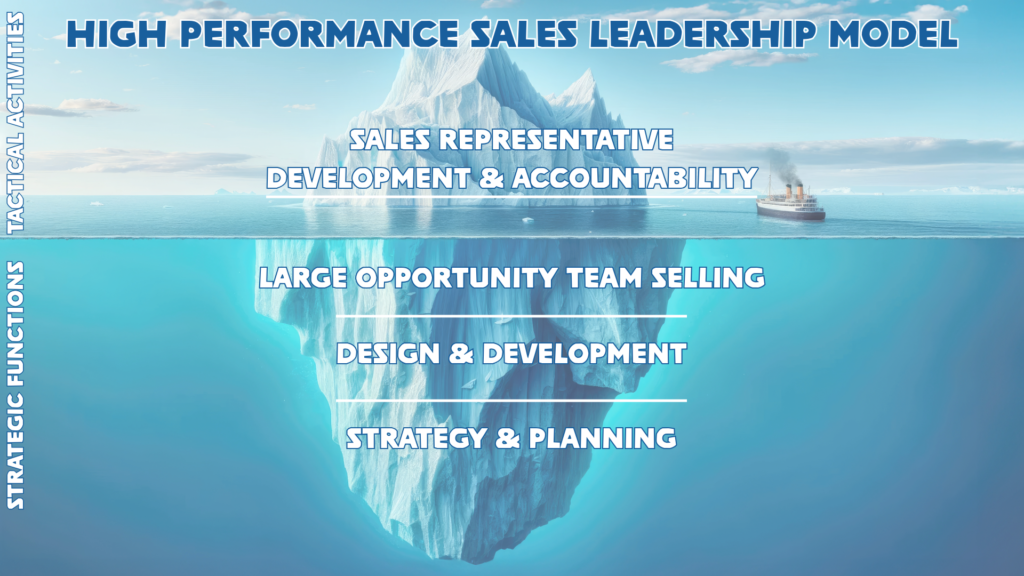Updated: January 2025
If you keep hearing that you need to upgrade your Customer Relationship Management (CRM) system to hit your sales goals, this article should help you avoid the staggering CRM failure rates abundantly published through the years.
Can a CRM Really Fix My Sales Team? The answer is simple… No.
CRM effectiveness remains a problem across all business sectors. As cited by Gartner, “Too frequently, sales leaders purchase sales technology on faith, believing that just by installing the technology they will drive better outcomes. In reality, Gartner research shows that just 24% of companies believe that their sales technology implementation is optimized.”
How can an organization determine if they’re ready to deploy a CRM and achieve strong ROI? The key lies in evaluating a few critical areas within your sales department.
Key Article Takeaways:
- Build a Solid Sales Foundation: Having a well-established sales system with clear lines of accountability is critical before implementing or upgrading a CRM.
- Sales Process Comes First: A proven sales process must be in place before introducing a CRM, as the tool alone cannot fix structural and execution issues.
- CRM is an Enabler, Not a Solution: A well-configured CRM enhances visibility, reporting, and performance tracking but cannot replace strong leadership and disciplined execution.
Do I Really Need a CRM?... “Yes”
CRM is unquestionably a foundational layer in a businesses’ technology stack. Configured properly, it’s an essential piece of software when it comes to effectively managing your sales team.
Without a way to capture and report on your sales team’s activity, it’s hard to hold your salespeople accountable and just as difficult to identify where they need help with skill gaps.
Despite these benefits, our robust survey data sheds light on a big opportunity within small and mid-sized businesses. Just as significant are the sub-optimized CRM implementations that my Fractional Sales Leader colleagues and I routinely encounter.

When a CRM is set up correctly with the right strategy driving it, the transparency and insight into the business is invaluable.
This is immensely helpful to you as a sales leader because you have access to your team’s pipeline progress through insightful dashboards. Instead of digging into every deal to find out what is going on, you can set up executive level views that expose when it’s necessary to take that deep dive.
The software doesn’t make a sales process work. I have seen sales teams perform without using a CRM during their early growth stage. It can’t improve lead conversion, navigate a complex buying group, prevent a deal from stalling, etc.
If your sales team isn’t hitting their numbers, a CRM likely isn’t the reason. It could play a part, but usually there are other foundational sales elements that need to be in order before a CRM can play its core role of enablement. Let’s look into those factors.
Establishing a Solid Sales Foundation Before CRM
Well Documented, Proven Sales Process:
Successful selling really comes down to having a clearly defined process and making sure you follow it consistently. Identifying what your sellers need to do may seem like common sense, but you would be surprised by some of the situations I have come across.
If your sales reps are consistently following up and closing deals by utilizing their Outlook calendars and post it notes, it’s hard to argue with success. Although, soon you’ll find this is not a scalable model as it relies much too heavily on “the right” salesperson being able to operate successfully in that manner.
Making sure you have a well-documented, proven sales process in place is the most important thing you can do to help your sales team perform to its potential. Read my prior publication to learn more about creating a successful sales process. Does Your Sales Process Generate Predictable Results?.
An Accountable Sales Culture:
In order for salespeople to succeed in their roles, they need to be accountable for their efforts and results.
Your team needs to understand their success depends on their own actions. They must follow the steps you outline for them and work to improve their results.
They need to understand their results are driven by the effort they put in.

When there is a wide range of success across a sales team, one of the first areas I investigate is accountability levels.
For example, a properly configured CRM will highlight a lack of follow-through on leads but that alone can’t fix the problem. In this case the more likely issue is that the salespeople aren’t consistently following an established lead conversion process nor are they being held accountable to do so. Therefore, even the best new software system won’t fix the root “people issue” problem.
Effective Sales Leadership and Coaching:
For any team to be effective, they need to be coached. A sales leader needs to have consistent 1-to-1 meetings with their team members to ensure that both top performers and those who aren’t hitting their numbers are focusing on the fundamentals that lead to success.
Regular sales team meetings need to be designed to include high-impact group activities that focus on skill development.
How are your sales meetings going?
- Do you fall into the trap of consuming group time analyzing each deal in the pipeline?
- Are you equipping your team with competitive differentiators to stand out from the crowd?
- How are you incorporating innovative AI tools to drive sales efficiency and effectiveness?
A CRM is far from a cure-all when the root problem is that the sales leader doesn’t have the background or time to effectively lead the sales team. A dedicated sales manager is a great asset when the business plugs them into a solid sales platform.
The common misstep is underestimating the scope of skills needed to satisfy the entire sales leadership “iceberg” and expecting the sales manager to perform beyond their experience level.

To explore how I can help you position your Sales Manager for success, check out a prior article I wrote called, “How to Set-up Your Next Sales Leader for Success“.
Helping You Navigate “the order of things”
I encourage you to take pause if your salespeople are advocating for the implementation or retrofit of a CRM being the answer to fixing their sales problems. First, you must look at your fundamentals and shore them up to create a solid platform for sales achievement.
When a CRM is positioned properly as the enablement tool it is meant to be, it can make a powerful impact. The key is being wise to the order of things.
This can be a lot for a top executive to sort out, especially when they are in the thick of it.
My colleagues and I lead hundreds of successful CRM selections and implementations each year in our client settings. We are unbiased resources who are well equipped to speak as an authority in this area.
If CRM has escalated to the top of your list, I am available to help you assess your current state and develop a plan for your unique environment. Please feel welcome to contact me at smuniz@salesxceleration.com.
I am part of a national group of Senior Sales Leaders who collaborate to share insights like the examples shown in this article. We formed because of our shared passion to help business leaders exponentially grow their revenue.

